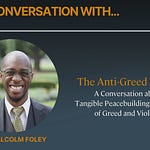(If you want to listen to the conversation outside of Substack, you can subscribe on Spotify, YouTube, or Apple Podcasts. Help us connect with more listeners by subscribing and leaving a review!)
The (Re)union Project is a movement of Christians trying to make sense of the conflicts dividing the church and how we have been complicit in those divisions. If we understand the origins of these deep divisions, perhaps we can imagine a new way forward. This episode of In Conversation With… seeks to identify ways forward for the church that involve a better sexual ethic.
The evangelical church has long made sexual ethics a central feature of its theology and claimed distinctiveness. In a world of promiscuity, changing sexual practices, and increasing crassness, the evangelical church has held itself apart as a light of purity and God-ordained sexual ethics. The results, however, have been far from what was promised. Studies reveal that the sexual practices of practicing evangelicals largely mirror those of the surrounding culture, and there is a horrifying amount of evidence of sexual abuse and complicity in systems of sexual exploitation.
Any conversations about healing the church and seeking unity must include a kingdom sexual ethic that will truly differentiate the church as a place of healing and justice in a world of sexual brokenness and exploitation. That brings us to today’s conversation with Dr. Amanda Montgomery and Dr. Hank Spaulding.
Dr. Montgomery is is a Licensed Marriage and Family Therapist and an ordained pastor in the Church of the Nazarene. Her doctoral work focused on what churches and communities should know before joining the fight against human trafficking. She recently published her first book entitled Human Trafficking: A Bible Study on Awareness and Prevention. Amanda is the founder of Olympia Pastoral Counseling and a speaker on topics including mental health, relationships, pastoral burnout, and trafficking awareness.
Dr. Spaulding is the editorial assistant for the Center for Barth Studies at Princeton Theological Seminary. He also serves as an adjunct professor of Christian ethics at Ashland University, Ashland Theological Seminary, George Fox University, and Indiana Wesleyan University. He is the author of several books, including Iconoclastic Sex: Christian Sexual Ethics and Human Trafficking.
Episode Overview
In this conversation, Greg Arthur engages with Dr. Amanda Montgomery and Dr. Hank Spaulding to explore the complex issues surrounding sexual ethics, human trafficking, and the church's role in addressing these topics. They discuss the historical context of sexual ethics within the evangelical church, the impact of trauma on survivors, and the importance of creating safe spaces for open dialogue. The conversation emphasizes the need for a more compassionate and informed approach to sexuality, rooted in scripture and community support, while also addressing the church's responsibility to confront its own shortcomings in these areas.
Episode Takeaways
The church's historical approach to sexual ethics has often been reactive rather than proactive.
Many individuals in the church struggle with understanding and discussing sexual ethics due to shame and fear.
Scripture can be misinterpreted, leading to harmful teachings about sexuality and trauma.
Creating safe spaces in the church is essential for survivors of sexual assault to feel supported and heard.
The church must recognize its own issues before addressing those in the wider community.
Survivor stories are crucial for understanding the complexities of sexual exploitation and trafficking.
Healthy discussions about sexuality should be encouraged within faith communities.
The church has a responsibility to educate its members about healthy sexual practices.
Belonging in the church should be based on love and acceptance, not moral superiority.
The church can play a vital role in healing by fostering open conversations about sexual ethics.
















Share this post